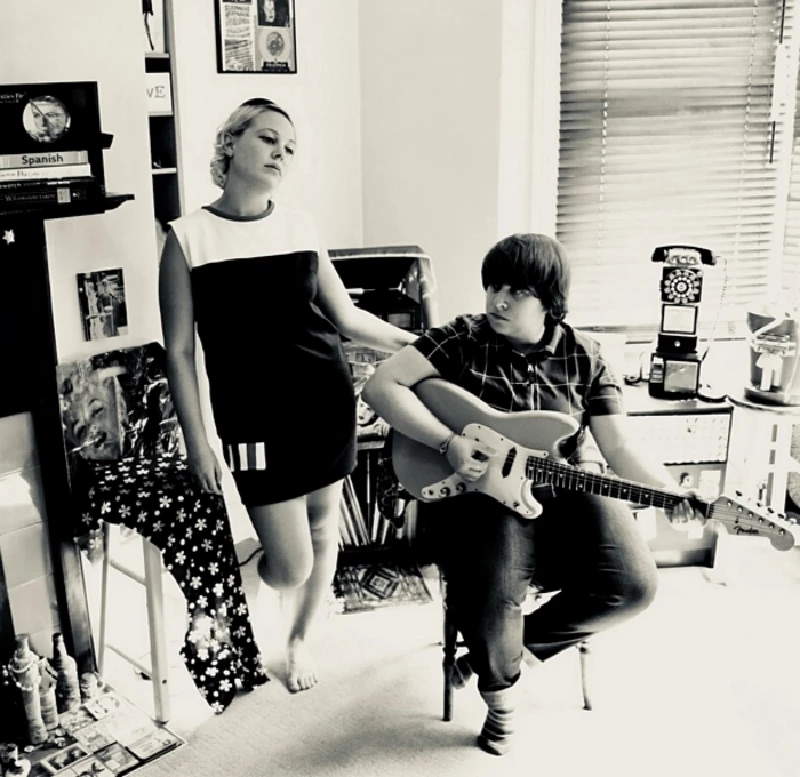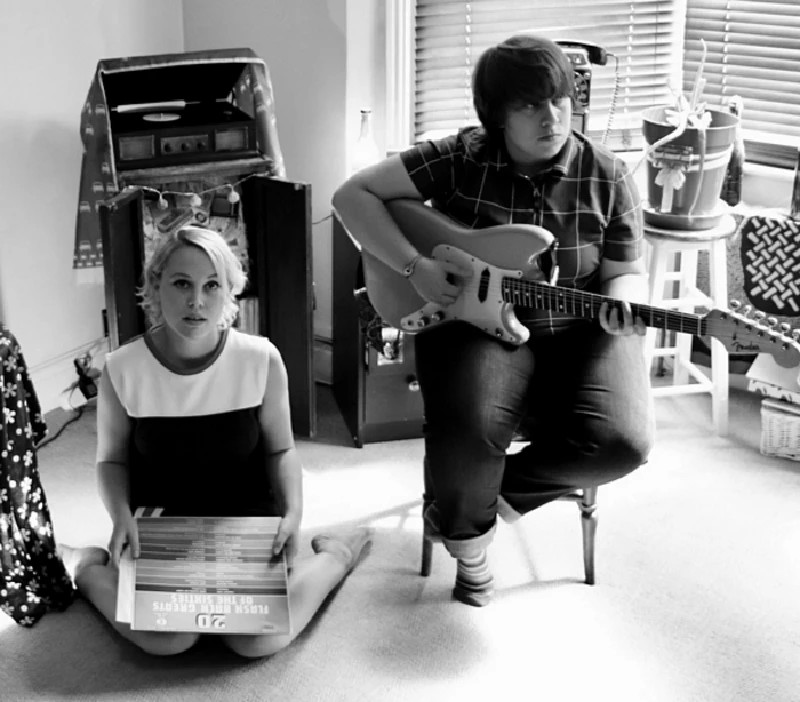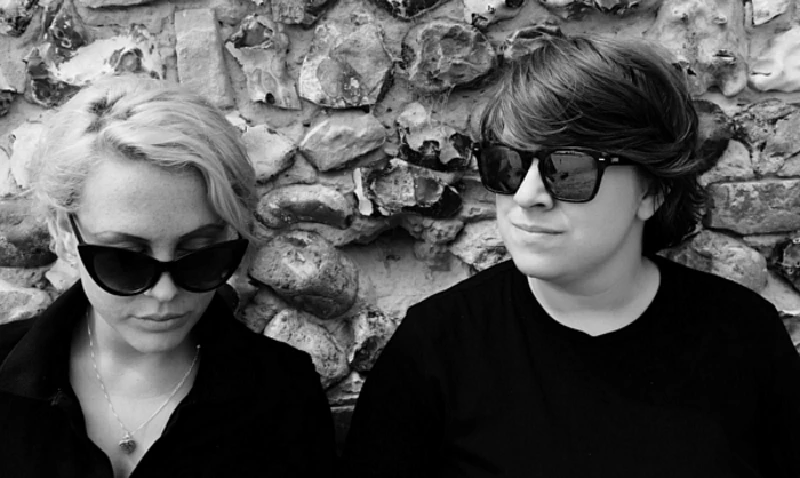Lucas and King - Interview
by Lisa Torem
published: 24 / 12 / 2018

intro
Lucas and King, the award-winning 60's-influenced duo which consists of vocalist Bo Lucas and guitarist Hayleigh King, discuss with Lisa Torem their just released eponymous debut album.
Lauded by the judges of a prestigious Fender Guitar Award and a roster of legendary touring bands, Southampton’s duo, Lucas and King, which consists of warm and subtle vocalist Bo Lukas and undeniably adventurous guitarist Hayleigh King, have been creating quite a stir in their native England as well as in the U.S. these days. Busy as ever, Lukas and King are preparing to play at the AmericanaFest UK next year in Hackney and are currently lauding their compelling debut. Despite their youth and musical open-mindedness, they draw their inspirations from a host of classic, enigmatic entertainers. In interview with Pennyblackmusic, they explain their unusual attraction to the giants of the past and how they consistently come up with unique material. PB: Congratulations on the release of your self-titled debut album. Let’s get down to the tracks. You two wrote ‘Crazy Heart’ in about fifteen minutes. How do you account for that accomplishment? HK: In general, I think it's a mystery where songs come from. They seem to form on their own. It was the first song we wrote together and it just sort of flowed out in a moment. We find most songs are moments in time. PB: Did you find that co-writing after that point was just as snappy or more of a challenge? HK: Our song-writing is always relatively snappy,. If an idea is going to become anything we usually have the skeleton of the song relatively quickly. The thing that takes the most time is filling the song out with layers of interest. PB: ‘Maybe I Do’ explores a curious ambiguity. From the killer line, “I’m treacherous/Don’t call my bluff” to “I just can’t expose my dark appetite,” the narrative exposes a protagonist who seems wracked with fear, yet longs to connect. Is that what you see happening in this song? BL: Yes, exactly! It’s the fear of losing control and being exposed but longing to wield and let go of that control. PB: The theme, ‘Dancing to No Music’ tends towards film noir: “Just so you know these sheets are thin/There’s no way to find the depth within…” The lyric is at once, disturbing, yet compelling. BL: It’s a referral to the power of mystery. There is a film noir connection in there, which I suppose is synonymous with the classic femme fatale. It’s a bit like a warning for a lover not to be lured by the mystery, as there may be something a lot darker and untamed hidden underneath the charm. PB: What came first, theme or the intense imagery? HK: I guess it would be theme, but in a way I think they are interconnected, imagery reinforcing the theme. PB: ‘Shop Girl’ suggests a coming-of-age crisis. Was the song based on anyone real? BL: Yes, me! Though I hope it has a universal theme in the sense that I think most people have had moments or prolonged periods of feeling like they are selling everything they have just to get absolutely nowhere in furthering anything that is truly important. PB: Ah, well said. Here’s also another ballad in which the guitar and vocals do their own thing, yet come together in a satisfying way. Did this occur during rehearsal or in the studio? BL: The song was written with acoustic guitar and vocals and then Hayleigh came up with her parts over the top. Most of the songs were finished prior to recording, and only ‘The Heart is a Lonely Wanderer’ and ‘Nothing on You’ were finished in the studio. PB: ‘The Heart is a Lonely Wanderer’ definitely recalls a beat from a past era. Can you reveal the influence here? HK: There is no direct influence. We both take inspiration from music and sounds that are from past era’=s and so I think there are always subconscious influences that come out in our music. PB: ‘I Only See Stars’ is a song beset by harmonies and an infectious Johnny Cash-like arrangement. When playing live, do you generally play a song the same way or do you allow for improvisation? HK: Bo usually has a clapping rhythm that the audience can join in on but apart from that it pretty much sticks to a straight up harmony and riff song. PB: ‘Moonshades’ finds the guitar and vocals interconnecting in a magical way. How many takes did you need to get this one just right? HK: Thank you. I believe it was two takes for that one. We have played that song a lot live so we know it inside out. PB: ‘Nothing on You’ has the lyrics “All the booze in the world ain’t got no edge on you.” There are some incredible lines here, and. to top it off, there’s that cool guitar solo when one least expects it. Hayleigh, what prompted that? HK: It felt right there. Most music just comes out. I never pre-empt where the music or my playing is going to lead. PB: This year, you received the prestigious Fender Undiscovered Artist Award which involved a trip to the States and more. What are your reactions? HKL: It’s great to be recognised for your creative output,. Getting that sort of recognition is a great boost. We absolutely fell in love with Los Angeles. It was a great prize. We would go back there in a flash. It’s completely bizarre and fabulous. PB: You have opened for such luminaries as Ray Davies. What were the highlights of that 2014 concert? BL: Where to begin, firstly Ray Davies is an icon and one of my heroes so it was pretty special. I never thought I would meet him or let alone play on the same stage. So when we first walked out on stage at the Cardiff show, there was a massive wave of applause. We were taken aback. We had never played to audiences like that and it was a complete rush. It’s a completely different experience when you play on that scale. We weren’t expecting to have such an attentive audience, being totally unknown, but they are probably still to this day some of the best gigs we have ever played. PB: How would you describe the music scene in Southampton these days and your role in it? HK: I think the music scene here is very closely knit and supportive. It’s great because people are rooting for you to be successful. PB: Your bio lists many long-age influences yet you are quite young. How do you account for this? BL: I have a record collection that has about four modern records and about ten times that from the 40’s up to the 80’s. Since I was a kid I was always taken by the melodies of Sixties music, I do try to keep up with modern music but something just doesn’t quite grab me in the same way. PB: More specifically, how did you discover artists such as songstress/arranger Peggy Lee? BL: The song ‘Do Right’ (‘Why Don’t You Do Right’) opened my eyes up to her, which I sang in a blues band, though I’d always known the name. I love watching videos of her. She had such a presence and charisma. And I love the fact that she was so sassy but effortlessly so; all in eyes and facial expressions. I think that sort of performance is underrated. PB: What are your goals as far as promoting your new album as well as for future projects? BL: We want to do so much and we feel like we have only scratched the surface of what we can do. We want to reach as many people as we can. We want to travel and gig as much as possible. There are a lot of things we do in-house at the moment, like videos and recordings, and I think in the future we would both like to create and do as much as we can between the two of us to a professional level. We hope this album is something that really captures where we are at the moment but where we can still go. PB: Thank you.
Band Links:-
https://www.lucasandking.com/https://www.facebook.com/lucasandking
https://twitter.com/lucasandking
Picture Gallery:-


most viewed articles
current edition
John McKay - InterviewRobert Forster - Interview
Cathode Ray - Interview
Spear Of Destiny - Interview
Fiona Hutchings - Interview
When Rivers Meet - Waterfront, Norwich, 29/5/2025
Carl Ewens - David Bowie 1964 to 1982 On Track: Every Album, Every Song
Chris Wade - Interview
Brian Wilson - Ten Songs That Made Me Love...
Shrag - Huw Stephens Session 08.12.10 and Marc Riley Session 21.03.12
previous editions
Heavenly - P.U.N.K. Girl EPBoomtown Rats - Ten Songs That Made Me Love....
Allan Clarke - Interview
Oasis - Oasis, Earl's Court, London, 1995
Manic Street Preachers - (Gig of a Lifetime) Millennium Stadium, Cardiff, December 1999
Barrie Barlow - Interview
Pixies - Ten Songs That Made Me Love...
Beautiful South - Ten Songs That Made Me Love...
Trudie Myerscough-Harris - Interview
Dwina Gibb - Interview
most viewed reviews
current edition
Peter Doolan - I Am a Tree Rooted to the Spot and a Snake Moves Around Me,in a CircleGarbage - Let All That We Imagine Be The Light
Vinny Peculiar - Things Too Long Left Unsaid
Vultures - Liz Kershaw Session 16.06.88
John McKay - Sixes and #Sevens
Little Simz - Lotus
HAIM - I Quit
Morcheeba - Escape The Chaos
Pulp - More
Lapsley - I'm a Hurricane, I'm a Woman In Love
Pennyblackmusic Regular Contributors
Adrian Janes
Amanda J. Window
Andrew Twambley
Anthony Dhanendran
Benjamin Howarth
Cila Warncke
Daniel Cressey
Darren Aston
Dastardly
Dave Goodwin
Denzil Watson
Dominic B. Simpson
Eoghan Lyng
Fiona Hutchings
Harry Sherriff
Helen Tipping
Jamie Rowland
John Clarkson
Julie Cruickshank
Kimberly Bright
Lisa Torem
Maarten Schiethart